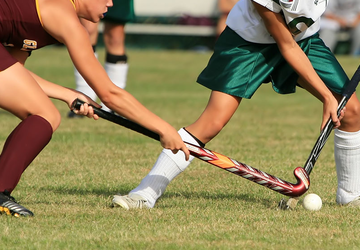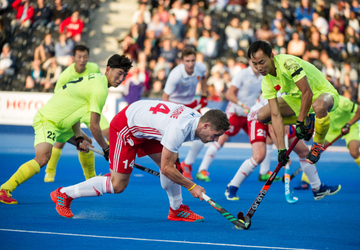Field hockey is a dynamic and exhilarating sport that demands a combination of physical prowess, tactical intelligence, and sharp technical skills. Whether you're a beginner or a seasoned player looking to up your game, mastering these ten essential field hockey skills will make you a more effective and formidable player.
1. Dribbling: The Art of Control
Dribbling is the bread and butter of field hockey. You can control the ball while running and maneuvering past opponents. To excel at dribbling, you need precise ball-handling skills. Keep your body low and your knees bent to maintain balance and control. Use the flat side of your stick to guide the ball with small touches, alternating between the forehand and backhand sides.
Practice dribbling through cones or around markers to improve your control and agility. Developing a confident and precise dribble will help you navigate the field and outmaneuver defenders.
2. Passing: The Key to Team Play
Effective passing is crucial in field hockey as it allows you to strategically distribute the ball to teammates. Master the basic push pass, using the flat side of your stick to push the ball accurately to a teammate. For longer passes, work on the hit pass, which involves striking the ball with the rounded edge of your stick.
Practice passing with a partner or against a wall to enhance your accuracy and power. Remember, good passing isn't just about your ability to make precise passes but also about receiving and controlling passes from your teammates.
3. Receiving: The Soft Touch
Receiving the ball is as important as passing it. A soft and controlled reception sets you up for the next move. When receiving, cushion the ball with your stick to absorb its momentum. Keep your eyes on the ball, bend your knees, and angle your stick to direct it where you want it to go.
Improving your receiving skills will make you a more reliable player, allowing you to turn a pass into a quick attack or maintain possession under pressure.
4. Shooting: Precision and Power
Shooting is the glory moment in field hockey. To become a top-notch shooter, practice your stance and grip. Keep your body low, your knees bent, and your weight on your back foot for balance. When taking a shot, use the full power of your legs and core to generate speed and accuracy.
Master both the push shot for close-range accuracy and the drag flick, a powerful shot used for penalty corners. Work on your timing and placement to become a deadly finisher.
5. Tackling: Defensive Prowess
Defense is an art in field hockey. Tackling effectively means dispossessing your opponent while avoiding fouls. The poke tackle, where you use the flat side of your stick to poke the ball away from an opponent, is a fundamental technique. Timing and positioning are crucial in tackling; aim to make a clean, precise interception.
Practice tackling with a partner to hone your defensive skills. Remember to stay low, maintain proper distance, and prioritize safety to avoid unnecessary penalties.
6. Positioning: Be Where You're Needed
Field hockey is as much about anticipation as it is about physical skills. Knowing where to position yourself on the field is vital. As a forward, be ready to receive passes and make goal-scoring opportunities. Midfielders should focus on controlling the midfield and transitioning between defense and attack. Defenders need to protect the goal and intercept opponent passes.
Watch and learn from experienced players to understand the nuances of positioning. Effective positioning will allow you to make better decisions and contribute more to your team's success.
7. Stick Handling: Artistry with the Stick
Stickhandling involves using quick and skillful stickwork to evade defenders and navigate tight spaces. Develop your ability to control the ball with quick, close dribbles. Use your wrist and hand movements to make the ball dance on the end of your stick.
Practice stick-handling drills to improve your finesse and agility. The better you are at stick handling, the more unpredictable you become as a player, making it challenging for defenders to stop you.
8. Vision and Awareness: Seeing the Whole Field
Field awareness is like having eyes in the back of your head. It's about constantly scanning the field to assess the positions of your teammates and opponents. Keeping your head up while dribbling or passing lets you make informed decisions quickly.
Improve your vision and awareness by practicing with your head up, even under pressure. Anticipate the movement of players around you and develop a sense of where the ball should go next. This skill is vital for orchestrating attacks and maintaining possession.
9. Physical Conditioning: Endurance and Speed
Field hockey is a physically demanding sport, requiring players to have excellent endurance and speed. Work on your cardiovascular fitness to maintain a high level of performance throughout the game. Interval training, sprint drills, and long-distance running can all help improve your stamina.
Additionally, focus on strength and agility training to enhance your speed and explosiveness on the field. A well-conditioned body will give you a significant advantage over your opponents.
10. Communication: Teamwork Wins Games
Effective communication is the glue that holds a field hockey team together. Clear and concise communication with your teammates can lead to better coordination and decision-making on the field. Use verbal cues, hand signals, and eye contact to convey your intentions and receive information from others.
Practice communication during training sessions and games. Develop a set of standard signals or calls that your team can use to communicate quickly and efficiently. Everyone on the same page will make your team more cohesive and effective.
Conclusion
Mastering these ten essential field hockey skills will make you a more competent player and elevate your enjoyment of the game. Field hockey is a sport that rewards dedication, practice, and continuous improvement. So, hit the pitch, work on these skills, and be prepared to shine as a field hockey superstar.




